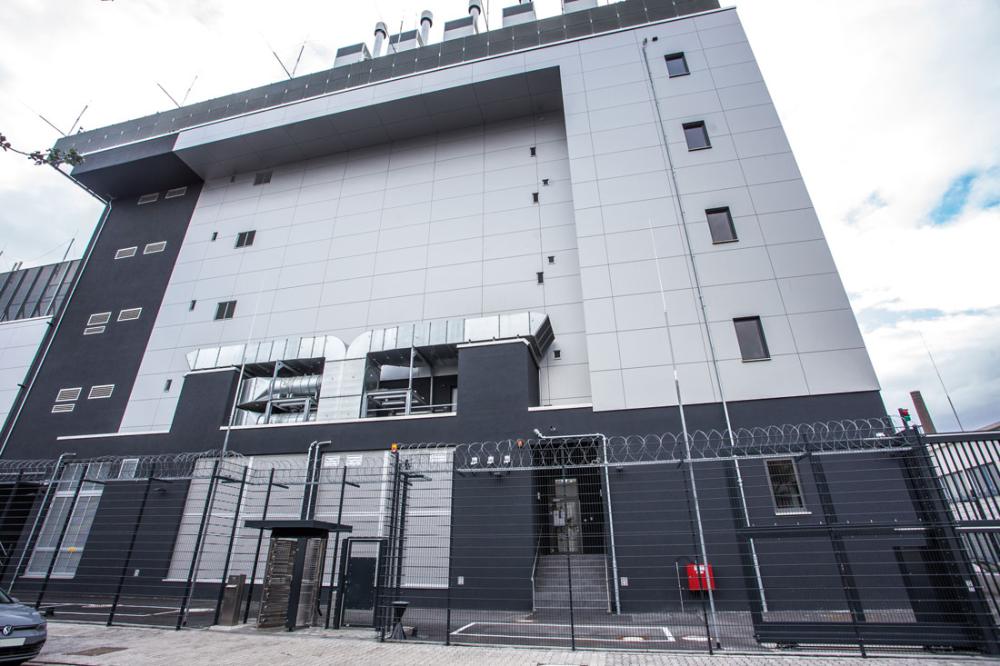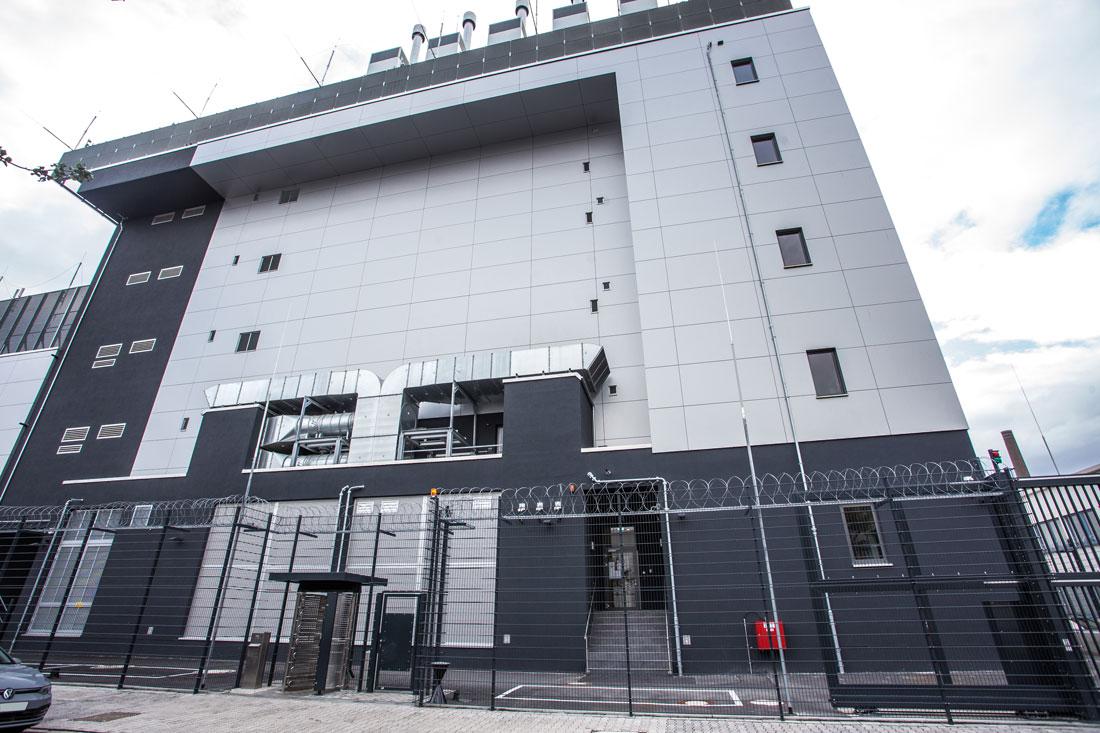
In an era of strained electrical grids and efforts to shrink carbon footprints, how do data center owners and operators manage their energy needs? In the case of Digital Realty (NYSE: DLR), the answer is by embracing the same innovative technology that is driving increased power demand: artificial intelligence (AI).
AI has generated extraordinary expectations for the future. From originating email content to spotting cyber hackers, AI is promising to change the world of consumers and businesses alike by processing massive amounts of data and learning from it.
However, prodigious amounts of energy to power data centers are needed to fuel AI’s number-crunching proficiency.
Data centers are already considered voracious consumers of energy, using as much as 1.5% of global electricity according to one model from the International Energy Agency, and AI is expected to drive even more power demand. In the U.S. alone, data centers are expected to consume as much as 7.5% of electric output by 2030, triple the amount in 2022, according to an estimate by the Boston Consulting Group.
“There are two sides to the AI coin for data centers,” says Aaron Binkley, vice president of sustainability at Digital Realty, which owns a portfolio of more than 300 data centers in over 25 countries. “One side is that AI is blowing up energy consumption at data centers and we have to build more power plants. The other is, that among the plentiful ways AI can deliver value, its ability to help us measure and reduce energy consumption is very compelling.”
Pilot Program
It was that second option, of harnessing the value of AI to improve efficiency, that Digital Realty turned its attention to.
In an effort launched in 2019 and led by Kasper Dessing, the company’s director of building management optimization, Digital Realty launched a pilot program at two European data centers for its in-house AI platform known as Apollo AI. It then implemented the platform across an additional 14 facilities. Through that initial rollout, Apollo AI has already identified 18 gigawatt-hours of savings—enough energy to power about 1,600 homes in the United States for a year.
In March, Digital Realty announced that it was expanding Apollo AI to the Asia Pacific region, beginning with Melbourne, Australia, and Singapore. Eventually, it plans to roll out the platform globally.
“We’re constantly talking with our colleagues in the U.S., and my guess is we’ll soon be in that region,” Dessing says. “We’re currently focused on the EU, because of regulations there.”

EU-Driven
Indeed, recent regulations in Europe are calling for improved data center energy efficiency and power usage effectiveness (PUE) disclosures, among other requirements. PUE is the primary energy efficiency measurement in the data center industry, and simply put, it is the ratio that is calculated by dividing a facility’s total energy load, or energy used, by the information technology (IT) load of its customers.
In an ideal world, data center PUE would be as close to 1.0 as possible, signifying that almost all energy is being delivered to computing equipment. A PUE of 2.0, on the other hand, indicates that half of the energy is powering equipment and half is going toward other operational functions such as cooling. Digital Realty does not report publicly on its PUEs, but according to the European Commission, EU data centers have an average PUE of 1.6. Ultimately the commission’s goal is for all data centers located in the EU to achieve PUEs as close as possible to 1.0.
To support that goal, the commission has established a data center sustainability rating system based on energy use and emissions. It soon will require centers of at least 500 kilowatts to report on total energy consumption, customer server utilizations, heat reuse and energy recovery, among other metrics. The rule is part of an overarching effort to reduce energy usage in the EU by 11.7% by 2030.
Separately, Germany has adopted a law that requires data centers to hit PUE targets of between 1.2 and 1.3 by 2030, depending on when the center began operating. It also includes waste heat and renewable energy obligations.
“We’re constantly working to make our facilities more efficient to conform to our own internal standards as well as regulations that are emerging in a few markets,” Binkley says. “The idea in Europe is to create more efficient data centers over time and to verify with actual real-world performance metrics. AI is just one of the tools we’re using to bring down our PUEs where we are not already in compliance.”
Heat Hunter
To track and improve Digital Realty’s PUE effectiveness, Apollo AI trained on a tremendous amount of historical operations data, and it continues to process additional data as it becomes available, Dessing explains.
Among other benefits of that education, Apollo AI can detect subtle temperature changes and other performance variances that suggest problems and then make recommendations to resolve them, he says. While some fixes are more involved than others, of the 18-gigawatt hours of identified energy savings by Apollo AI, about 14 gigawatt hours represent relatively quick remedies, he adds.
One of the speedier solutions involved Apollo AI’s discovery of heat around a chilled water filter hidden deep inside the bowels of a data center. That was an indication that the filter was clogged, which was putting an extra load on a pump to move the coolant, Dessing says. By replacing the inexpensive filter, energy usage dropped by 75 megawatt-hours per month in the summer, and at least 225 megawatt-hours per year, he reports.
Similarly, Apollo AI located a faulty three-way valve that was allowing heat to escape. Given that a single data center could have hundreds of filters and valves, the likelihood of a human finding tiny heat fluctuations in such a labyrinth would be slim.
“These were very nice findings that the human brain just wouldn’t detect,” Dessing says. “There are a lot of operational specialists who can do magic with tools like Excel, but the amount of data that our AI is working with goes far beyond that level.”
Still, Apollo AI hasn’t replaced the expertise of those engineers, who plan and implement remediation projects based on the technology’s recommendations. For that reason, in the earliest days of Digital Realty’s AI development communication has been key to the program’s effectiveness, Dessing says.
“We didn’t want to present this as a system that was taking over their jobs, but something that was going to make their life easier,” he says. “We’re really enabling the data center engineers to have more insight; they can analyze everything recommended by the AI and focus their efforts on projects that have the biggest impact.”

Eye on Sustainability
Leveraging AI is a natural outgrowth of Digital Realty’s efforts to enhance energy and water usage efficiency and sustainability across its portfolio, Binkley says. Other initiatives include sourcing renewables, building LEED certified facilities, and developing innovative cooling solutions.
While regulators are beginning to pay more attention to operational efficiencies, so too are customers. The cost of power is passed on to tenants, many of whom are also striving to become more sustainable in their operations. That includes wanting more energy efficiency solutions from their data center providers, Binkley points out. Apollo AI gives Digital Realty the ability to show customers tangible improvements and savings.
“In conversations with our customers, they want to know that we’re operating as efficiently as we can,” he adds. “So, they’re always excited to hear about these types of innovations because they’re looking for sustainability wins.”
Meanwhile, Wall Street is focused on operational efficiencies in general, he continues. While Binkley acknowledges that the REIT has yet to scale Apollo AI to the point of materially affecting its earnings, the platform is contributing to overall lower operating expenses.
Using Apollo AI to wring out energy efficiency represents low-hanging fruit at the moment. But as it looks forward, Digital Realty anticipates using the platform for predictive maintenance and other applications, some of which may only be discovered as the AI continues to learn, Binkley says. In his view, there may be no better classroom for that schooling than the data center.
“Data centers operate 24 hours a day, seven days a week and 365 days a year. They are one of the most energy intensive asset class within real estate,” he says. “Certainly, AI is a topic that’s at the front and center of attention for a lot of folks these days, and we have a ripe opportunity to be a part of the responsible implementation.”

